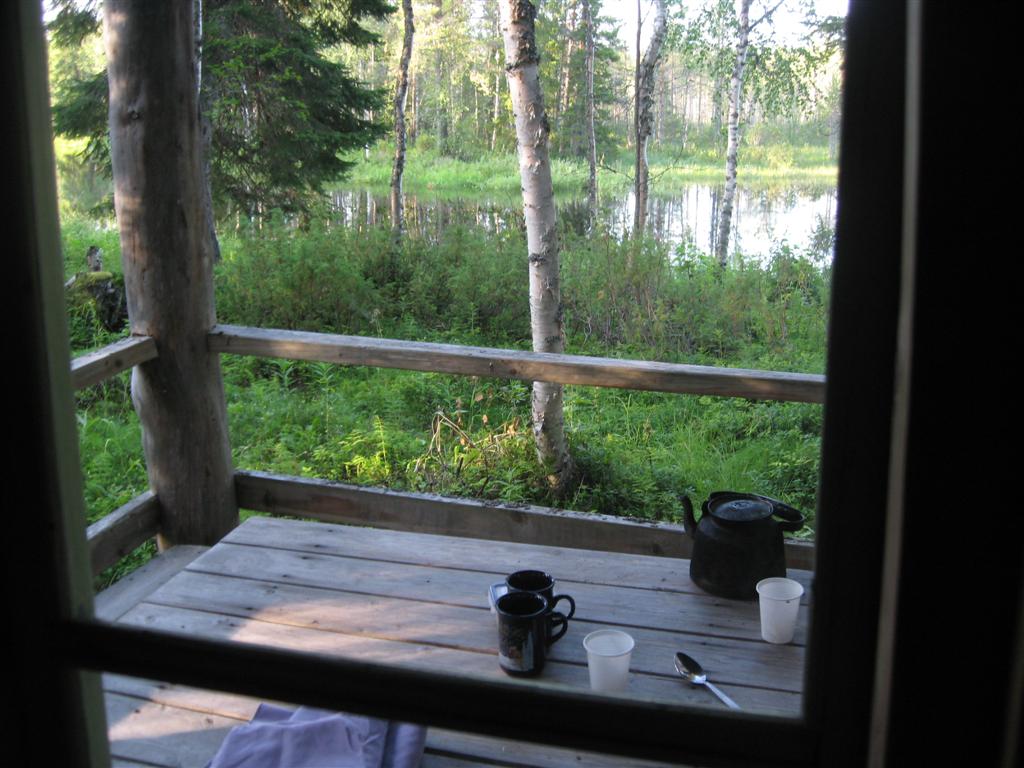A cabin in the forest.
I have always yearned for a space to write, my own space, a place where I could close the door away from the obligations and responsibilities and just think and be. .
It was just a few yards from the river, on it’s own small peninsula, where the dark stream from the forest joined the larger flow of water coming down from the lake. Trees grew all around it, birch, spruce, and tall graceful pencil pines that caught the sun on their chestnut trunks and the shimmering aspen. The forest floor was covered with bilberry, heather, small bright green ferns that made intricate patterns like an oriental carpet, sphagnum moss, horsetails and Ledum paludris, swamp rosemary.
The hut was a raised roofed box, 15 foot square, constructed of broad horizontal planks of pine, weathered grey and caulked with resin. To the right of the door was a single window divided into four squares of glass. In front, the roof was extended over a veranda and supported on corner posts. The floor was loose and springy sending cups tumbling off the rough wooden table. A wooden railing ran and hand height half way round. Access to the veranda was by a tilted block of cemented red bricks. There was a blackened metal coffee pot hanging from a hook to the left of the door.
To the right of the hut was a simple open woodshed with a lozenge shaped opening that tapered towards the floor. Stacks of logs stood to the side of it and more logs were arranged against the wall of the house. A narrow path led to what looked like a tilted wooden sentry box with a door and a wooden latch, the sort of casual contruction, Australians call a ‘dunny’!
A key was hidden in a round hole above and to the right of the window and the door opened with a subdued and respectful click. The space inside had the kind of rustic cosiness, I enjoyed as a teenager; my den! The walls were rough and lined with fire- blackened planks of wood. The pine floor was new as were the rugs, a homely touch. A stove rested on a metal platform in centre of the room. It was the sort of stove you would find in a sauna, an oblong box with doors and topped with large pebbles, and a black chimney that was cemented into what looked like a big tin box below the ceiling. The red paint on it was faded and flaking.
There was a wooden bunk in against the back wall to the right of a simple oblong window that looked back into the forest, and another adjoining bed on the right wall. On the left hand wall were shelves and cupboards which held mugs, matches, paper towels, red plastic bowls, a large saucepan for boiling water and smaller cooking pot with a metal handle. A small axe, its blade protected in a leather sleeve hung up besides saws and knives, an assortment of fishing equipment and three pairs of carpet slippers.
There was a table to the right of the door. It was made of pine and varnished to a smooth shine. I could ‘see’ pencils, notebooks, a sketch pad, my favourite pen with the silky nib, a field guide to the flowers and trees, a slim volume of poems, some trophies, a stick chiselled by a beaver, some polished stones, pine cones, a small branched antler.
I could work here. I’d sit there and gaze out of the window at the river, the white clouds over the dappled greens of the swamp, the play of light on the pines, lulled by the breeze in the trees, the occasional muffled riff of water and the soft lilt of a forest bird. There is a melancholy peace about it, a place to rest, a creative meditation.
In the evening I’d make a fire and cook the pike I had managed to hook earlier. I’d mix up a sauce from the mushrooms that sprung up after the rains and perhaps, if was lucky enjoy a dessert of cloudberries. Then I would sip my coffee, gaze into the fire and let the river, the fire and evening work their spell.



